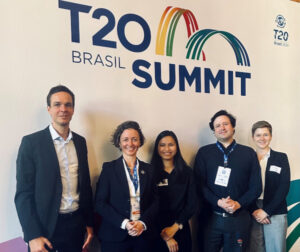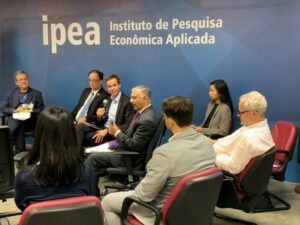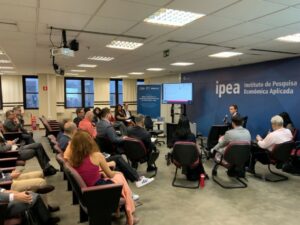2024 has been a “super-election year”. Nearly half of the world’s population casted their votes in more than 60 countries around the globe, amongst them the G20 member states Indonesia, Russia, India, South Africa, Mexico, the European Union (EU), Brazil (municipal elections) and the United States (US), as well as several African countries represented in the African Union (e.g. Ghana, Rwanda).
The results of these elections will set the conditions for cooperation on implementing the 2030 Agenda for Sustainable Development and advancing sustainable development beyond. They will shape how we approach challenges and solutions, such as the rapid advances in artificial intelligence and digitalisation.
2024 also marks an important year for key multilateral processes, with major events such as the UN Summit of the Future, the BRICS+ Summit in Russia, UNFCCC COP29 in Baku, and the G20 Summit in Brazil. Looking ahead, South Africa will assume the G20 Presidency in 2025, concluding four consecutive years of Southern presidencies in the G20. Meanwhile, Brazil will continue its important role in leading two key multilateral processes – assuming the BRICS+ presidency and hosting the UNFCCC COP30 in Belém in 2025. The Think20 (T20) Summit under the Brazilian G20 Presidency has been an important occasion for the G20 and the T20 engagement group to assess the new conditions for global cooperation on sustainable development.
IDOS experts actively contributed to this year’s T20 process in multiple ways: Prof. Anna-Katharina Hornidge was a member of the International Advisory Board. Dr Axel Berger acted as Lead Co-Chair of Task Force 4 ‘Trade and Investment for Sustainable and Inclusive Growth’ and Dr Ulrich Volz was a member of Task Force 3 ‘Reforming the International Financial Architecture’.
To contribute further to these discussions, IDOS / Managing Global Governance (MGG) Programme and the Institute for Applied Economic Research (IPEA) organised a T20 Side Event titled “Global cooperation on sustainable development after the 2024 election year” on 13 November. The event aimed to reflect on the outcomes of elections in G20 member countries (and beyond) and their implications for global cooperation on sustainable development. At the same time, it also offered a platform for diverse actors within the T20 community to exchange on key issue areas and priorities for 2025.
The event opened with welcome remarks by Dr Luciana Mendes Santos Servo (President of IPEA). Facilitated by Vy Dang, Eva Lynders and Dr Wulf Reiners, the Side Event allowed for an interactive exchange among participants by using the fishbowl format. Discussion was kicked-off with a video input by Prof. Anna-Katharina Hornidge (Director of IDOS) as well as by expert inputs from Prof. Sachin Chaturvedi (Director General, Research and Information System for Developing Countries), Dr Richard Ponzio (Director of the Global Governance, Justice and Security Programme, Stimson Center), and Dr André de Mello e Souza (Head of the International Policy Centre for Inclusive Development, IPEA).
The discussion revolved around assessments of the recent elections in India, the US, the EU and the municipal elections in Brazil. It also highlighted the increasing importance of the Global South and regional cooperation in global governance and the urgent need for reform in international organisations. Beyond that, environmental issues were at the centre of the discussion, with emphasis on Brazil’s potential and prominent role in global environmental issues. Concerns were raised regarding the risk of setbacks, including a potential U.S. withdrawal from the Paris Agreement and cuts to climate funding under a looming Trump administration.
The event was co-organised by IPEA and IDOS/MGG. It took place in the framework of the PRODIGEES project of the MGG programme with financial support from the European Union, the Federal Ministry for Economic Cooperation and Development (BMZ) and the Ministry of Culture and Science (MKW) of the State of North-Rhine Westphalia.



